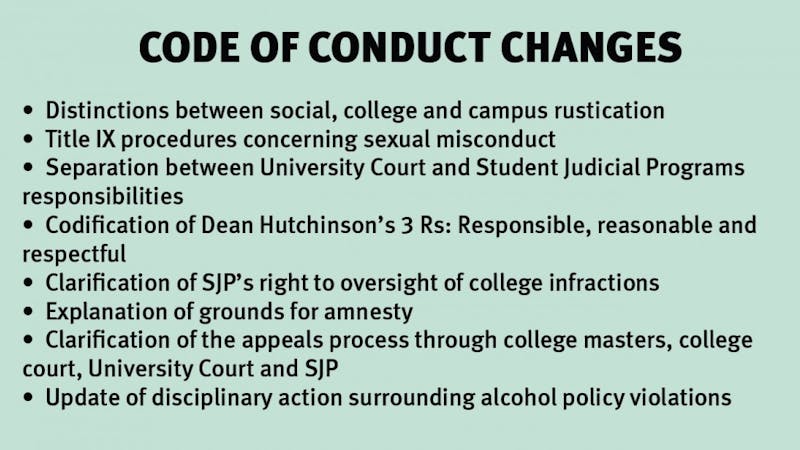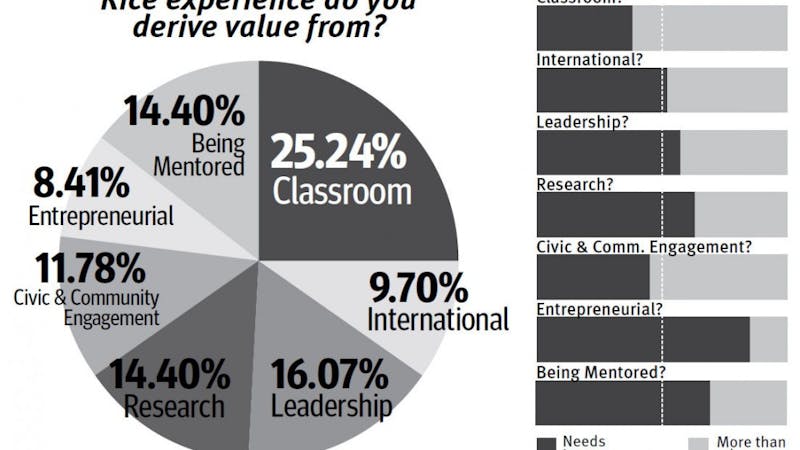NEWS
12/3/14 7:12am
By Drew Keller
Drew KellerStaff WriterA Faculty Senate committee is studying the school’s policy of awarding course credit for high scores on most Advanced Placement and International Baccalaureate exams amid concerns that such credits give some students an unfair advantage and a less comprehensive college education.University Committee on the Undergraduate Curriculum Chair Susan McIntosh presented an analysis of the committee’s current policy on Pre-Matriculation Credits at the Nov. 12 Faculty Senate meeting. McIntosh said many other universities have reduced the amount of AP and other exam credit they grant in recent years.“We wanted to just examine, to see the kind of effect of these credits and our policies, which are quite liberal,” McIntosh, a professor of anthropology, said.According to McIntosh, the committee found that students with more exam credit hours spent significantly less time at Rice, based on data from students who matriculated in 2006, 2007 and 2008.“Students who are coming in with less than 20 to 30 credit hours are, in general, taking more than eight semesters to graduate,” McIntosh said. “[Students] who are coming in with over 30 are taking between 7.5 and eight semesters to graduate. What we take from this is that it’s a disadvantage for students to come in without many credit hours that their majors require.”Additionally, the committee’s data showed a clear correlation between exam credits and GPA, with more exam credits corresponding to a higher GPA. Michael Wolf, the faculty director of the Rice Emerging Scholars Program, said students without many exam credits might not be as prepared as their peers for college academics.“There happens to be a very high correlation between not very many AP courses and decently crummy high schools,” Wolf, a professor of mathematics, said. “So it’s not just how many college credits you come in with; it also correlates to their general preparation to do Rice work.”Wolf also said international students have less access to AP courses, though IB and several other programs offer comparable credit. However, according to President David Leebron, access to college-comparable courses in high school does not affect admission to Rice.“We judge applicants by the level of courses they take relative to what is offered at their school,” Leebron said. “Students who attend a school that offers honors credit, and who choose not to take those courses, ... are heavily disadvantaged in the application … They can get straight As and we don’t treat that as a straight-A student.”At the Faculty Senate meeting, several faculty members expressed support for reducing the extent to which AP credit is applied, including Gerald Dickens, a professor of earth science. “There should be a minimum threshold of what a student has to experience in college, has to experience in classes,” Dickens said. “There should be a minimum threshold of distribution.” Dickens said he was concerned with students’ ability to get a Rice degree with a relatively small number of actual college classes and students using exam credits for distribution and never taking classes outside of their major. “I think the argument that students are taking too many classes is false,” Dickens said. “It’s students taking [fewer] and using AP credits, consistently.”However, the data presented by McIntosh showed the number of credits students earn at Rice generally is not affected by the number of pre-matriculation credits, at least for the large majority of students matriculating with fewer than 60 exam credits. The mean number of Rice credits earned by graduation increased slightly from 116.7 to 119 between 2006 and 2008.“We didn’t see any trend [with regards to pre-matriculation credits] there,” McIntosh said. “[Exam credits] allow students to experiment with more majors in different types of schools.”Michael Diehl, a professor of bioengineering and chemistry, also disagreed with the argument that students use exam credits to reduce the number of courses they take at Rice.“It’s my impression that it could be quite the opposite,” Diehl said. “I’ve had a number of students come through my laboratory who want to do research but don’t have the time … They’re loading up on credits, not getting out of them. I think there’s a tendency in the undergraduate populace to take too many courses.”According to Wolf, the workload required by many majors, especially in natural sciences and engineering, is difficult for students to handle without pre-matriculation credit. Wolf questioned whether it was plausible to graduate with majors such as bioengineering without exam credit. Adrian Perez, a Brown College freshman, also said test credit could provide a valuable advantage.“It’s helpful to have a head start with AP credits, especially for engineering,” Perez said. “I think [the credit system] is fine how it is right now, but if they were to change something it would only be for specific majors … Like a chemistry major wouldn’t be able to use AP Chem, but any other major would be. I know [General] Chemistry is way harder than AP Chem.”Cody VanZandt, a sophomore computer science major, said his lack of AP credit has set him back in his major. VanZandt’s high school did not offer AP classes for him to take.“I know for sure it’s put me definitely behind the ball on my Comp Sci degree, especially switching into Comp Sci sophomore year,” VanZandt, a member of Brown College, said. “At this point, I’m going to have to take classes outside of Rice. Especially if you decide to change your major, it makes a serious difference.”



